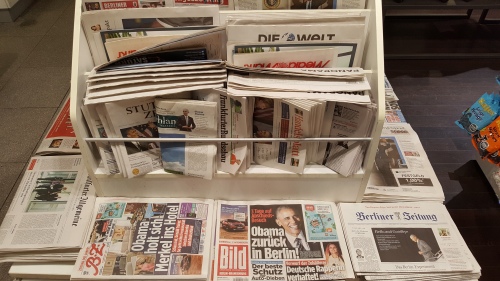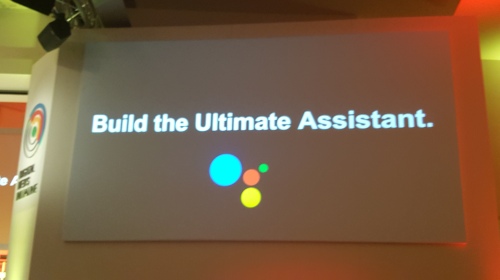November 17, I attended a Google Digital News Initiative event in Berlin, where a new round of €24 million in grants was announced and developments in media discussed with various publishers from across Europe. (More on the winners here – lot’s of interesting initiatives.)
30 minutes took me from Tegel airport and its abundant offer of local printed newspapers to a conversation focused on the future of media and news.

It was an interesting event with very good group of attendees, lively discussions during the sessions and even more so during the breaks.
My take-aways (check #dniberlin for more discussion)—
Journalism remains challenging and news a tough business, but both are important and I take 3 positive things from what I heard and conversation with various publishers.
- First, it is great to see a gradual move beyond vague talk of “innovation” to how leaders can encourage it, how everyone in an organization needs to engage for it to succeed, and to how new and more diverse skills are needed. This is in line with what Lucy Kung’s research has found and others working on change and innovation too and it is good to see more publishers embrace these ideas—even as innovation and change in practice remains difficult and the environment continues to change faster than many publishers have been able to change themselves.
- Second, more and more news media are embracing the idea that you need to try things, test them, evaluate, and repeat to constantly adapt and learn. This is a move away from the tendency to talk about and perhaps in practice focus on big-bang type initiatives that takes months to develop and require lots of resources and often in-fighting and resistance, to a greater focus on all the little things one can do to constantly try to improve and adapt, and how one can both empower decentral teams to try things while also having ways of deciding what to go ahead with and what not.
- Third, there is obviously competition and even conflict between different actors in the wider ecosystem, but also a real interest in collaboration, in identifying synergies and win-win scenarios. No one can “go it alone”, so news media, technology companies, and other actors including foundations, non-profits, and universities need to find each other and find ways of working together.
News media are frequently criticized for being conservative and slow to change. Many of them are, and the pace of change and the pain of collapsing revenues in itself neither explains nor excuses this.
But it is also important to recognize that, as Alessio Cornia, Annika Sehl and I have found in our research on how private sector media and public service media across Europe are adapting to change that some of them have both (a) invested a lot in digital media and (b) build very significant audiences, produced great journalism, and in some cases found promising business opportunities.
Not everyone is equally conservative. And some of those who have tried more aggressively to change have done demonstrably better. A few media companies seem content to die with their current aging (print/broadcast) audience without fighting to build a digital future, but that is, thankfully, not the general outlook.
On the technology side, Google gave short presentations of various products, including the Accelerated Mobile Pages project, YouTube player for publishers, and various products around monetization.
The two most interesting things gauging from what people were buzzing about during the breaks were—
- Rudy Galfi (Product Manager for the AMP Project)’s presentation on the development of “Progressive Web Apps” that aim to combine the discoverability (through links, search, social etc.) of the open web with the engagement and good user experience of native apps. As publishers think about scale versus niche, and about building reach and converting people to loyal (and potentially profitable) users, this is an important area.

- The demo by Behshad Behzadi (Director of Conversational Search) of Google Assistant, an attempt to “build the ultimate assistant” by developing a personal virtual AI assistant that can be controlled by voice and provide highly contextual, personalized, interactive information and services. It is being rolled out initially via the Google Pixel smartphone and the Google Home smart speaker, but will be available across smartphones, wearables and more in the future. As Laurence Kozera (Google Global Product Partnerships) put it, “as news publishers, you should be thinking ‘voice’ right now, and how you can integrate it into assistants”. And from December, developers can build “actions” for Google Assistant. As the content will be delivered via the assistant, publishers will wonder about the usual issues around distributed content–recognizing the opportunity, but also wonder about editorial control over brand identity, access to data, and opportunities for monetization.

